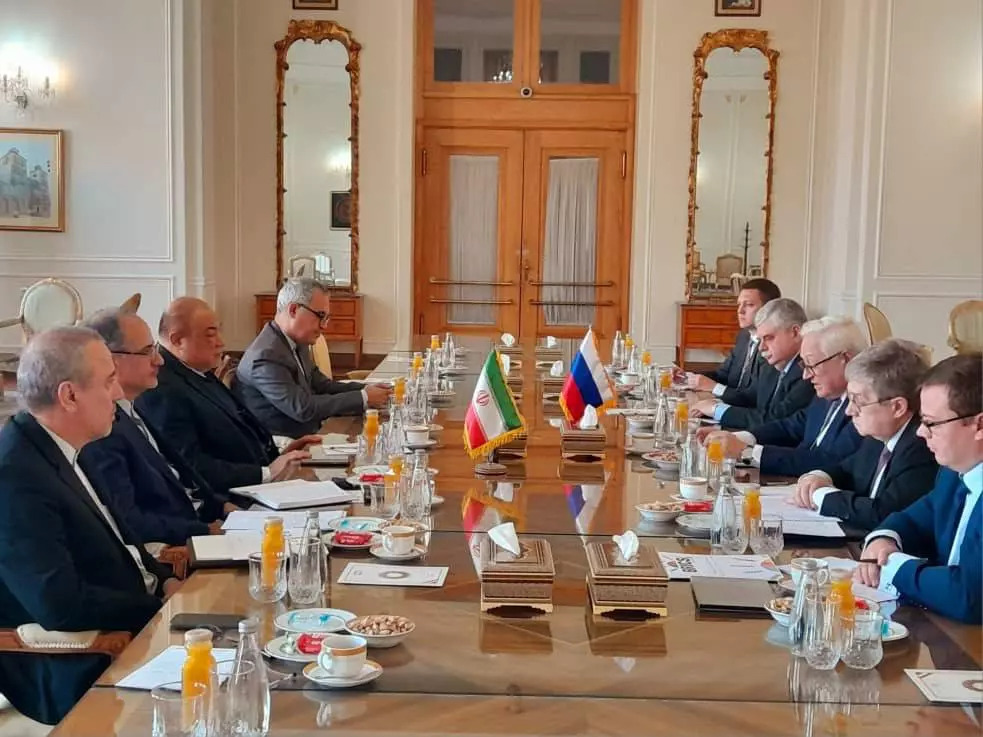The Iranian and Russian deputy foreign ministers have held discussions on the BRICS group and its fields of activities.
At a meeting in Tehran, Iran's Deputy Foreign Minister for Economic Diplomacy Mahdi Safari hosted Russian Deputy Minister of Foreign Affairs Sergey Ryabkov, who is also his country's special envoy for BRICS affairs, the Iranian foreign ministry’s website reported on November 15.
Ryabkov congratulated Iran for its membership in the BRICS group and pointed out the beginning of Russia's rotating presidency from January 2024.
The Russian deputy foreign minister highlighted Moscow’s priorities in relation to BRICS during his country's presidency and presented a briefing on the history and background of BRICS actions.
For his part, Safari described the field of BRICS activities as very broad and diverse, and expressed the country's resolve to be an active participant in the group
He added that Iran’s Foreign Affairs Ministry will make all efforts to play an effective and constructive role in the group.
The deputy ministers exchanged views about the activities of the organization in the economic, financial, trade, energy, transportation, parliamentary, agriculture, new technologies, scientific research, health, information technology, environment, air-space, sports, cultural, youth and BRICS development in the future.
BRICS, an acronym for a collective of five major emerging economies – Brazil, Russia, India, China, and South Africa, functions as a collaborative force to bolster economic development, trade, and geopolitical influence on the global stage.
It was announced at the 15th BRICS Summit in South Africa in August that six countries, including Iran, Argentina, Egypt, Ethiopia, Saudi Arabia and the United Arab Emirates, had been invited to join the bloc, and their membership would take effect on January 1, 2024.
For Tehran, the BRICS alliance represents a potent platform within the realm of emerging markets, offering an appealing alternative to the Western-dominated order.
The drive towards de-dollarization resonates as a recurring theme among BRICS nations, who are collectively committed to reducing the global economy’s reliance on the US dollar for trade. Spearheaded by Russia due to geopolitical circumstances following the Ukrainian war, this initiative finds resonance among all BRICS members.
Both Iran and Russia, facing Western sanctions, have significantly deepened their relations in various sectors, notably in military and defense, cementing their status as close allies.
Criticism from the West has been directed at Tehran for its support of Russia in the Ukrainian war, particularly in providing kamikaze drones. However, Iran refutes the notion that these arms were supplied for use in the war. Tehran acknowledges delivering a “limited number” of drones several months before the Russian invasion of Ukraine.
In late September, Iranian President Ebrahim Raisi expressed gratitude for Russia’s backing of Iran’s BRICS membership in a phone conversation with his Russian counterpart Vladimir Putin.
“BRICS is one of the emerging organizations effective in shaping the multipolar world and a suitable field for the expansion of bilateral, regional and international interactions between Iran, Russia and other member countries,” Raisi said.
In the BRICS coalition, China stands prominently with the largest economy, contributing over 70 percent to the formidable $27.5 trillion economic aggregate. India accounts for around 13 percent, while Russia and Brazil each represent approximately 7 percent, as per data from the International Monetary Fund (IMF).
Together, the BRICS coalition commands a remarkable 40 percent of the global population and roughly 26 percent of the global economy.







 President Ilham Aliyev shed light on the evolving contours of the peace process with Armenia during an international conference in Baku this week. ...
President Ilham Aliyev shed light on the evolving contours of the peace process with Armenia during an international conference in Baku this week. ...
 Azerbaijan and Armenia started the process of demarcation of their border on Tuesday, with the installation of the first border markers based on ge...
Azerbaijan and Armenia started the process of demarcation of their border on Tuesday, with the installation of the first border markers based on ge...
 President Aliyev emphasized the critical role of the North-South Transport Corridor in fostering transport cooperation between Azerbaijan and Russi...
President Aliyev emphasized the critical role of the North-South Transport Corridor in fostering transport cooperation between Azerbaijan and Russi...
 Iran and Pakistan have signed eight cooperation documents in various fields, and agreed to strengthen ties to fight terrorism in the region.
Iran and Pakistan have signed eight cooperation documents in various fields, and agreed to strengthen ties to fight terrorism in the region.
 As the conflict between Ukraine and Russia escalates, the strategic importance of Kharkiv, Ukraine's second-largest city, has come sharply into focus.
As the conflict between Ukraine and Russia escalates, the strategic importance of Kharkiv, Ukraine's second-largest city, has come sharply into focus.
 Iranian President Ebrahim Raisi expressed Tehran’s readiness to participate in significant development projects in Sri Lanka during the inauguratio...
Iranian President Ebrahim Raisi expressed Tehran’s readiness to participate in significant development projects in Sri Lanka during the inauguratio...



